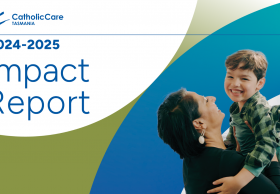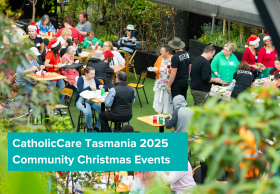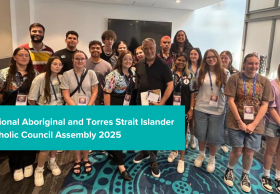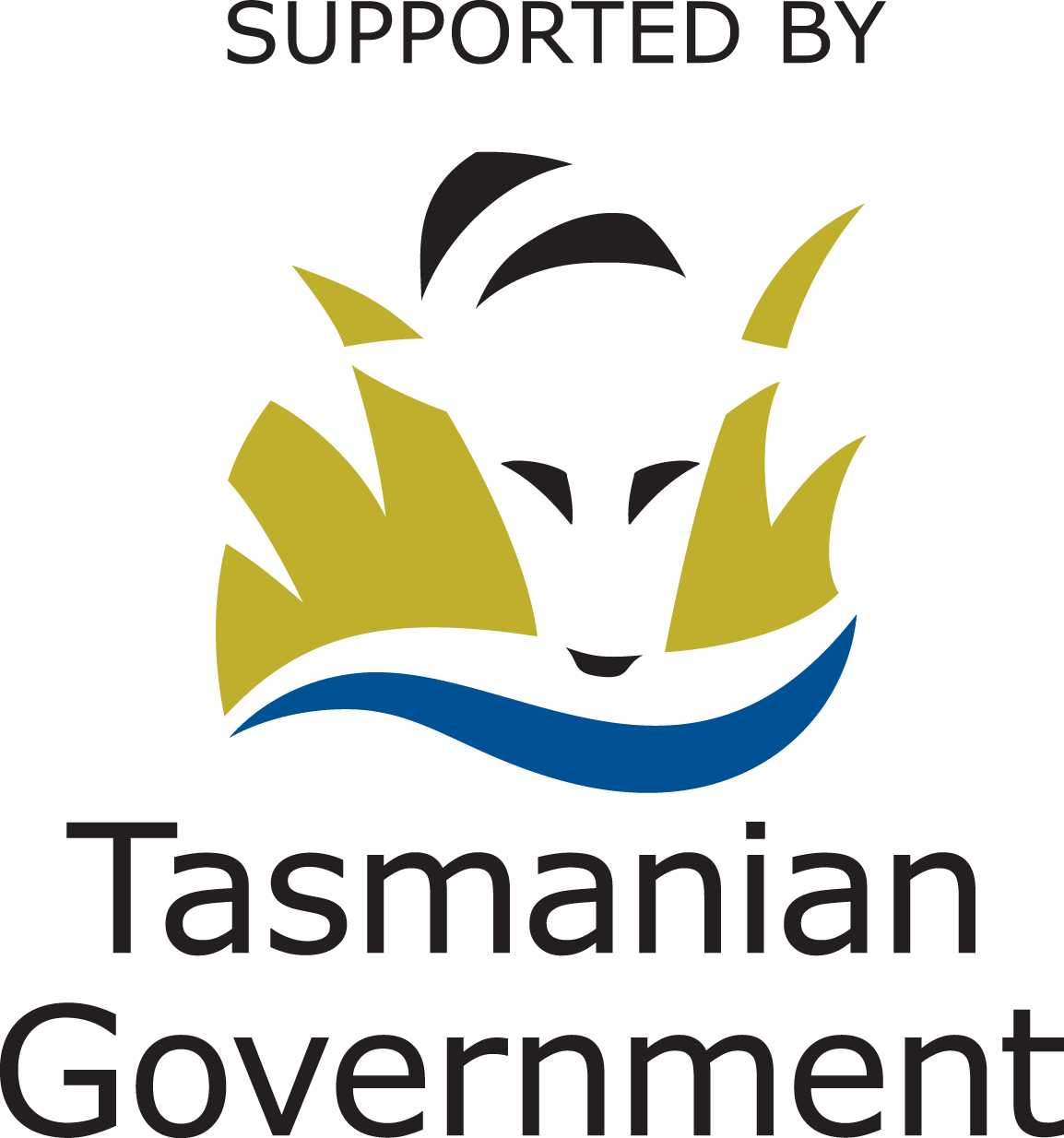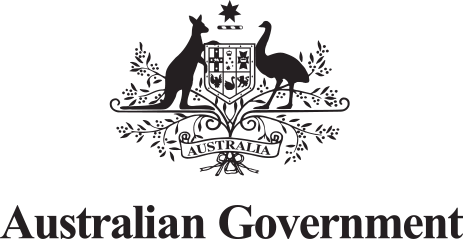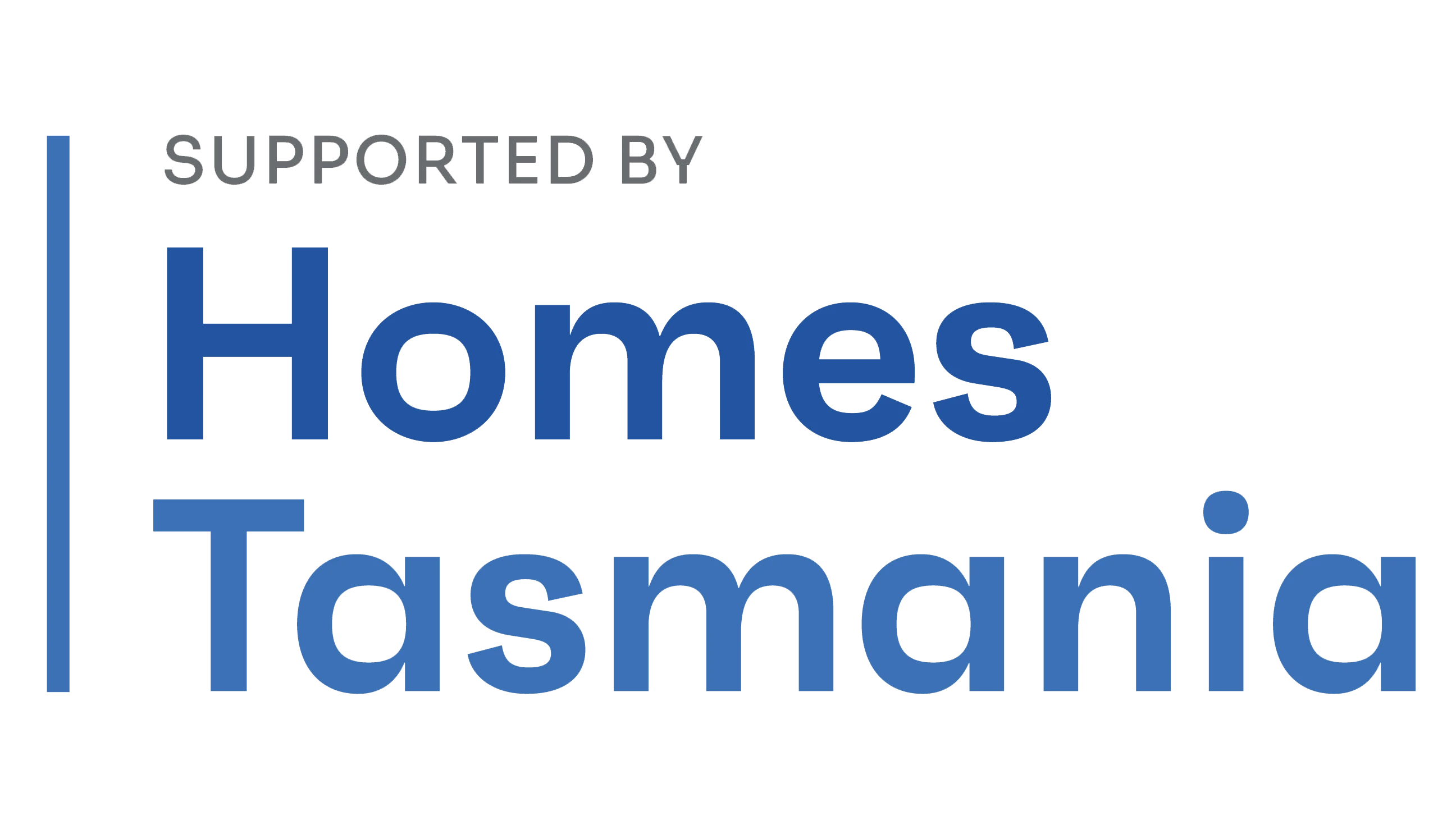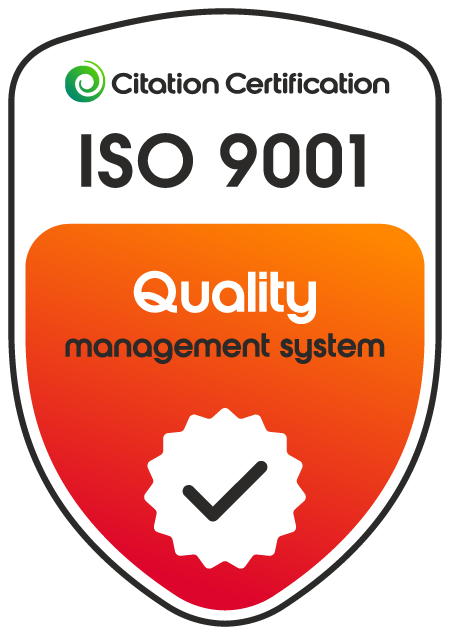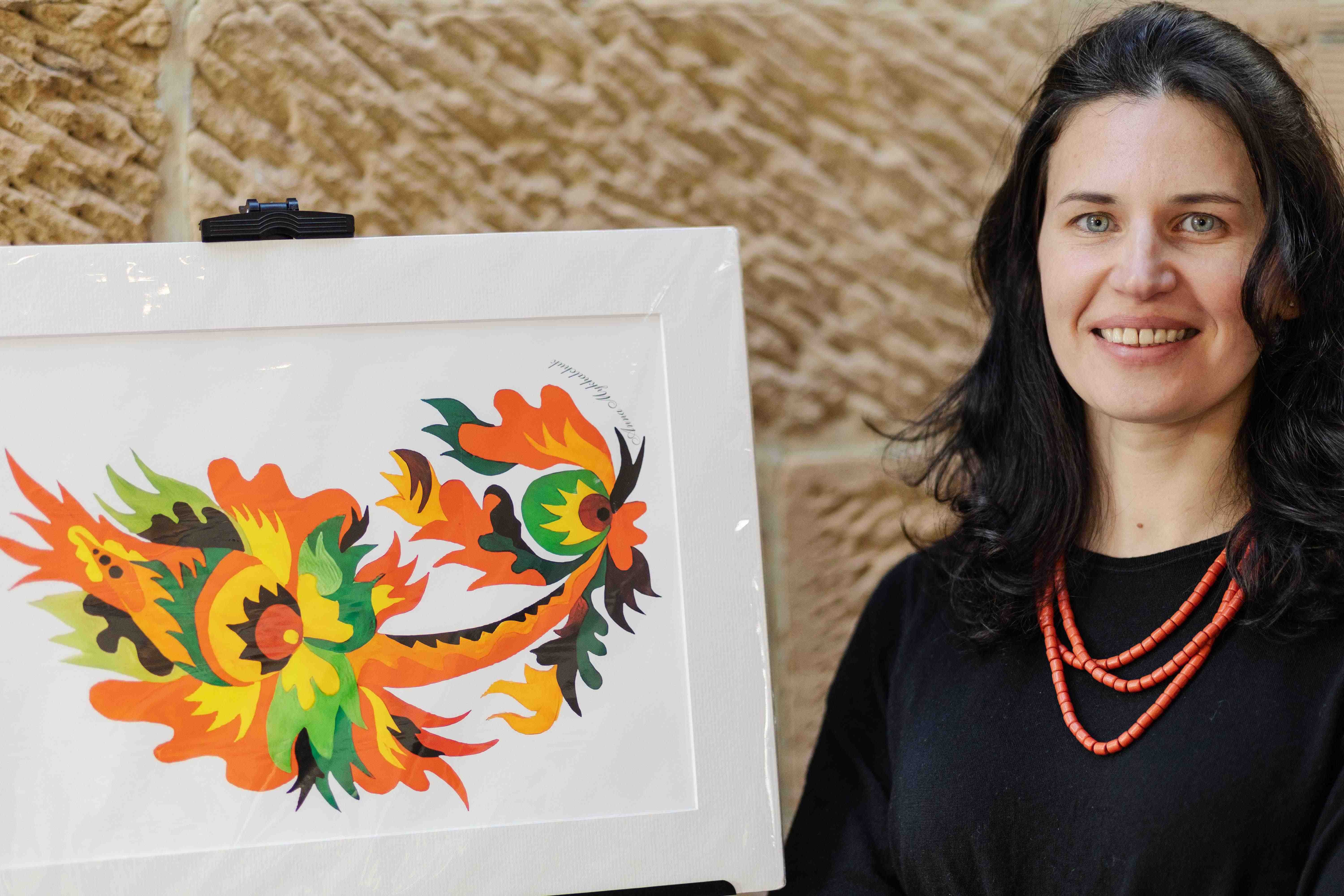
The emotion on people’s faces as they see her brightly coloured folk art is worth more than words to Ukrainian artist Anna Mykhalchuk.
The entrepreneur is one of Tasmania’s newest small business owners, thanks to a course offered by CatholicCare's Multicultural Programs. Her business, along with two others, launched at the Multicultural Start-Ups Market in Hobart in July.
“My inspiration is different, but mostly is about nature and diversity of nature,” Anna explained.
“I try to emphasise beauty around me. This style of painting allows as many colours as you want. When I get these colours, I feel happiness.”
The artist said she had been deeply touched by people’s reactions to her work.
“They said it was gorgeous, beautiful – something new and unusual for them,” she said.
“I like to see the emotion. It's more than words, it's your feelings.”
Multicultural Programs Employment and Projects Facilitator Natalie Booley said feedback for the initiative, which supports artists with migrant or refugee background to launch their own small businesses, had been overwhelmingly positive.
The intensive course guides creators through the process of starting a business, from understanding licenses, registrations, and tax through to developing marketing, branding and online presence.
“Through my work I noticed there were a lot of clients looking for small business support, and not quite knowing how to navigate the system and process here, being relatively new to Australia,” Natalie explained.
“We tried to make it as simple as possible and break down some of the barriers they were facing. We developed an eight-week program where they learn the key parts of starting a small business – from inception, business plan and knowing your customer base through to marketing, pricing, and going online with your business.”
Natalie said financial advice had been the most valuable element for participants.
“They didn't quite understand what their obligations were here as a small business owner, so stepping them through those processes of financing, tax obligations, those kinds of things was very important,” she said.
“Typically, a lot of our clients are very entrepreneurial, and they're used to having family businesses in their home country, and really wanting to do that here. We are here to provide that support.”
Anna said the course had helped her find the confidence to launch her business.
“When you're in another country, it's hard to know how to do all these things,” she said.
“After these sessions, I know more about where I can get information and I'm really thankful for this. This course was very good for me.”
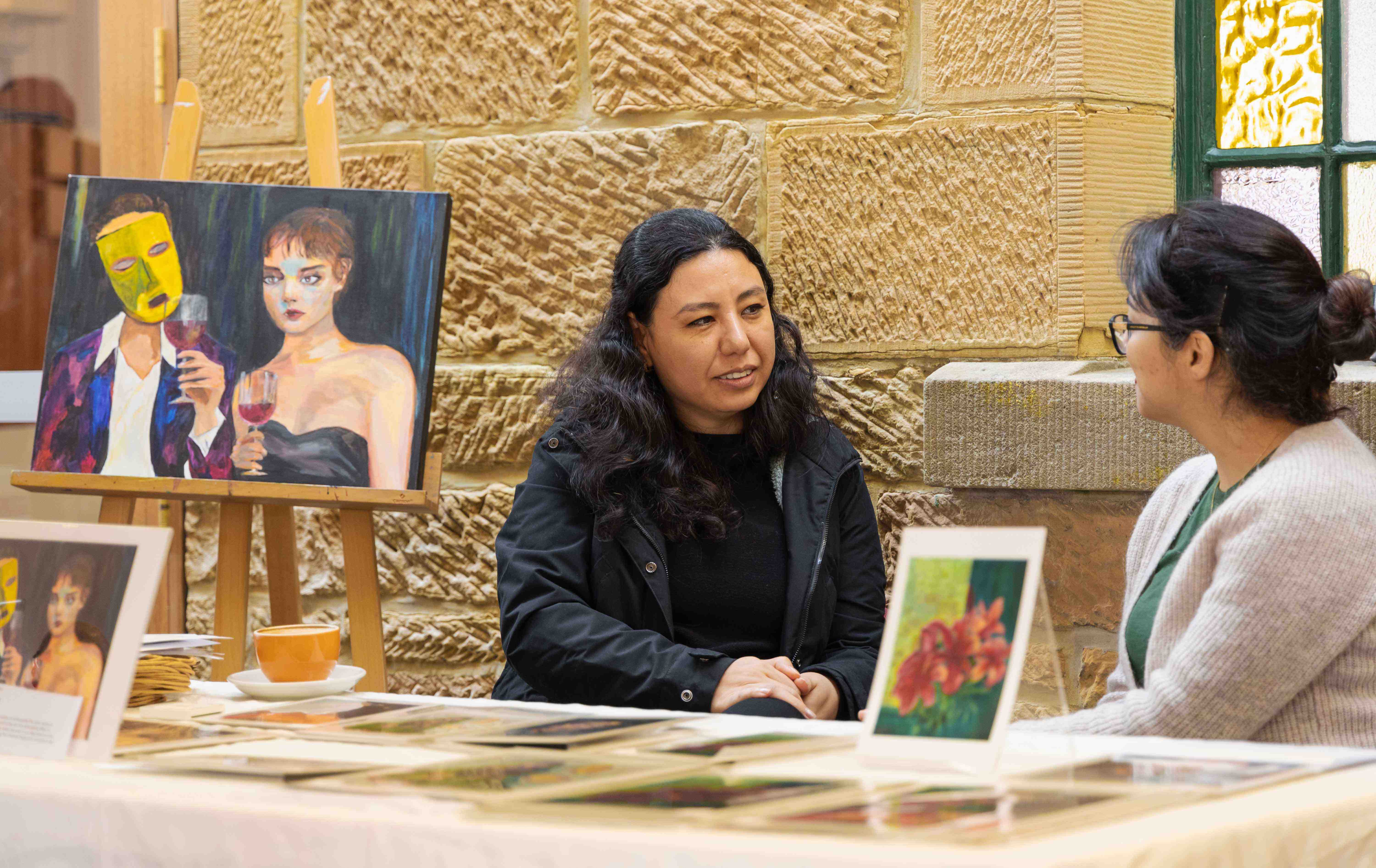
Fellow artist Sakina Parsa, from Afghanistan, said support offered through the course had been wonderful.
“Before coming to Australia, I could sell some artwork, but once I got here it was very confusing what I should do,” she said.
“With this program we received all the information that we needed – registering for my ABN number, setting up my website, and the market day.”
Sakina said the opportunity to sell her original paintings and prints at the event was exciting.
“I feel that if the artwork makes the viewer feel connected to themself, or exploring new beliefs and new perspective, then my message has transferred to people,” she said.
“It was very wonderful, I'm still excited.”
Natalie said the program would continue to run in themed sectors, so participants could build a peer support group.
“They've already had ideas for collaborations around workshops together, and we step them through the same processes at the same time, based on that particular sector,” she explained.
“In this program we've had three participants – one participant from the Ukraine, painting traditional Ukrainian folk art, another from Afghanistan, with emotive style portraits, and then our final participant, from China, doing digital art and graphic design. So, three very different styles, but very similar projects and similar needs.”
Natalie said it was rewarding watching the group come together and share ideas.
“They've enjoyed that opportunity to meet people they may not have come into contact with before joining this program, so it's been a really wonderful project in many ways,” she said.
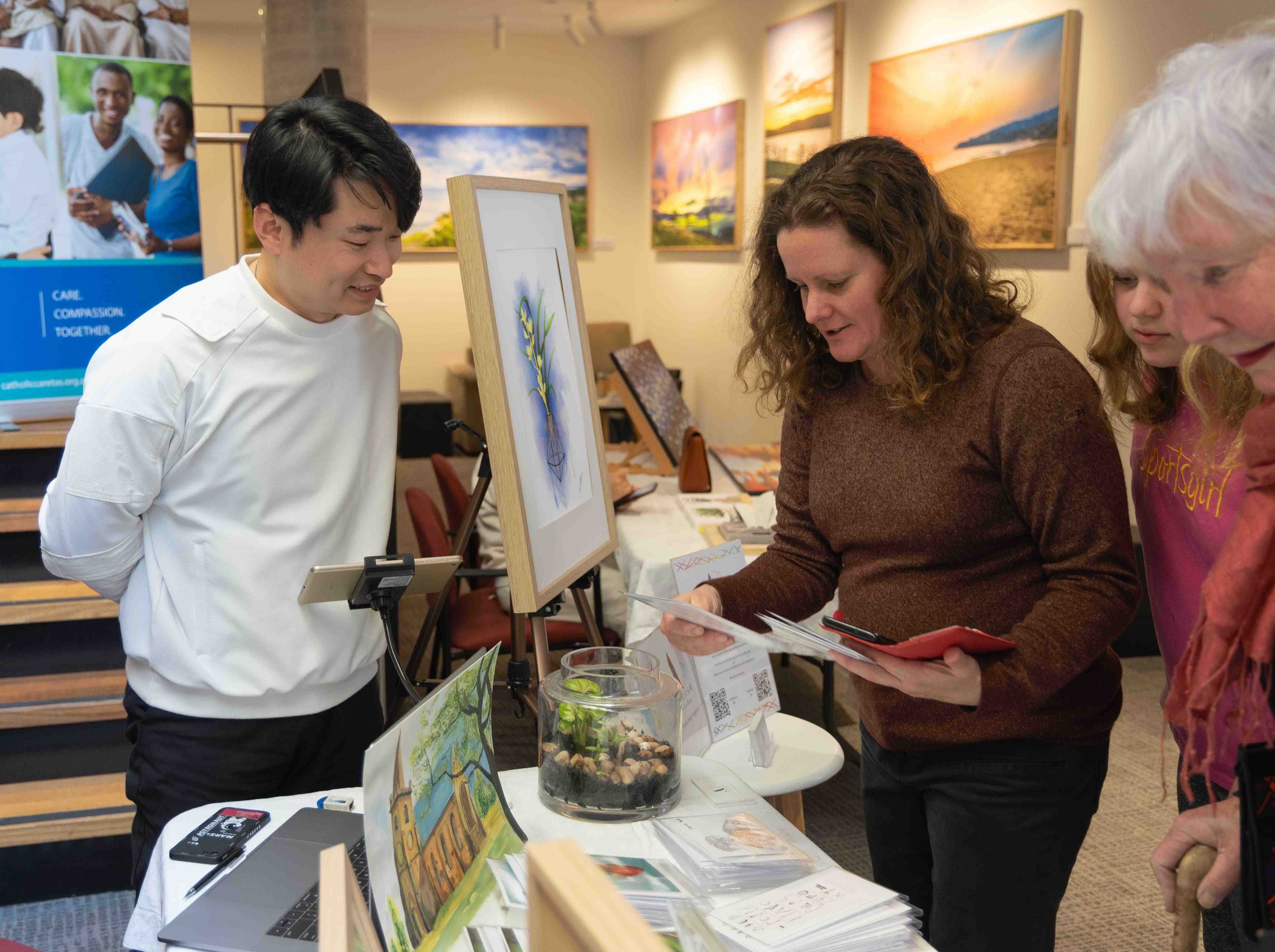
Chinese digital design artist and graphic designer Austin Yang said the course had been invaluable.
“This course is helpful – they will be giving you all of the support and the idea how you set up everything,” he said.
“After that, we can get to this bazaar, and it's just like a small try to test your business, how it's going. From here, you can know many people come visit and we can talk each other. With that face-to-face contact, people will know each other much more and give them a future service.”
Program partner City Networks Director Kelvin Smith said the next course would be based around hospitality businesses.
“We've got some phenomenal chefs,” he said.
“We have one lady who did five years at a five-star restaurant in Kabul, and then she moved to Mumbai and she was head of kitchen at a five-star hotel. Now she's in Hobart, with not a great deal of English, but phenomenal capacity to deliver exquisite cuisine. So just helping her navigate the system, clarifying her dream.”
Kelvin said the entrepreneurialism already existed, but help was needed to navigate the regulations.
“I think there's massive scope. We've just got to provide pathways to go from the dream to the reality,” he said.
“It's my dream that Hobart becomes a welcoming space, and that when people come here, they're able to anchor down and they're able to buy their house and stick their roots down. The reward of seeing somebody having their dream realised is addictive. You see the joy that comes on someone's face, and the kind of joy that you feel in that space is phenomenal.”
CatholicCare Tasmania’s Multicultural Employment Service is supported by the Tasmanian Government.
Other news you may be interested in

The emotion on people’s faces as they see her brightly coloured folk art is worth more than words to Ukrainian artist Anna Mykhalchuk.
The entrepreneur is one of Tasmania’s newest small business owners, thanks to a course offered by CatholicCare's Multicultural Programs. Her business, along with two others, launched at the Multicultural Start-Ups Market in Hobart in July.
“My inspiration is different, but mostly is about nature and diversity of nature,” Anna explained.
“I try to emphasise beauty around me. This style of painting allows as many colours as you want. When I get these colours, I feel happiness.”
The artist said she had been deeply touched by people’s reactions to her work.
“They said it was gorgeous, beautiful – something new and unusual for them,” she said.
“I like to see the emotion. It's more than words, it's your feelings.”
Multicultural Programs Employment and Projects Facilitator Natalie Booley said feedback for the initiative, which supports artists with migrant or refugee background to launch their own small businesses, had been overwhelmingly positive.
The intensive course guides creators through the process of starting a business, from understanding licenses, registrations, and tax through to developing marketing, branding and online presence.
“Through my work I noticed there were a lot of clients looking for small business support, and not quite knowing how to navigate the system and process here, being relatively new to Australia,” Natalie explained.
“We tried to make it as simple as possible and break down some of the barriers they were facing. We developed an eight-week program where they learn the key parts of starting a small business – from inception, business plan and knowing your customer base through to marketing, pricing, and going online with your business.”
Natalie said financial advice had been the most valuable element for participants.
“They didn't quite understand what their obligations were here as a small business owner, so stepping them through those processes of financing, tax obligations, those kinds of things was very important,” she said.
“Typically, a lot of our clients are very entrepreneurial, and they're used to having family businesses in their home country, and really wanting to do that here. We are here to provide that support.”
Anna said the course had helped her find the confidence to launch her business.
“When you're in another country, it's hard to know how to do all these things,” she said.
“After these sessions, I know more about where I can get information and I'm really thankful for this. This course was very good for me.”

Fellow artist Sakina Parsa, from Afghanistan, said support offered through the course had been wonderful.
“Before coming to Australia, I could sell some artwork, but once I got here it was very confusing what I should do,” she said.
“With this program we received all the information that we needed – registering for my ABN number, setting up my website, and the market day.”
Sakina said the opportunity to sell her original paintings and prints at the event was exciting.
“I feel that if the artwork makes the viewer feel connected to themself, or exploring new beliefs and new perspective, then my message has transferred to people,” she said.
“It was very wonderful, I'm still excited.”
Natalie said the program would continue to run in themed sectors, so participants could build a peer support group.
“They've already had ideas for collaborations around workshops together, and we step them through the same processes at the same time, based on that particular sector,” she explained.
“In this program we've had three participants – one participant from the Ukraine, painting traditional Ukrainian folk art, another from Afghanistan, with emotive style portraits, and then our final participant, from China, doing digital art and graphic design. So, three very different styles, but very similar projects and similar needs.”
Natalie said it was rewarding watching the group come together and share ideas.
“They've enjoyed that opportunity to meet people they may not have come into contact with before joining this program, so it's been a really wonderful project in many ways,” she said.

Chinese digital design artist and graphic designer Austin Yang said the course had been invaluable.
“This course is helpful – they will be giving you all of the support and the idea how you set up everything,” he said.
“After that, we can get to this bazaar, and it's just like a small try to test your business, how it's going. From here, you can know many people come visit and we can talk each other. With that face-to-face contact, people will know each other much more and give them a future service.”
Program partner City Networks Director Kelvin Smith said the next course would be based around hospitality businesses.
“We've got some phenomenal chefs,” he said.
“We have one lady who did five years at a five-star restaurant in Kabul, and then she moved to Mumbai and she was head of kitchen at a five-star hotel. Now she's in Hobart, with not a great deal of English, but phenomenal capacity to deliver exquisite cuisine. So just helping her navigate the system, clarifying her dream.”
Kelvin said the entrepreneurialism already existed, but help was needed to navigate the regulations.
“I think there's massive scope. We've just got to provide pathways to go from the dream to the reality,” he said.
“It's my dream that Hobart becomes a welcoming space, and that when people come here, they're able to anchor down and they're able to buy their house and stick their roots down. The reward of seeing somebody having their dream realised is addictive. You see the joy that comes on someone's face, and the kind of joy that you feel in that space is phenomenal.”
CatholicCare Tasmania’s Multicultural Employment Service is supported by the Tasmanian Government.
Other news you may be interested in
Other news

